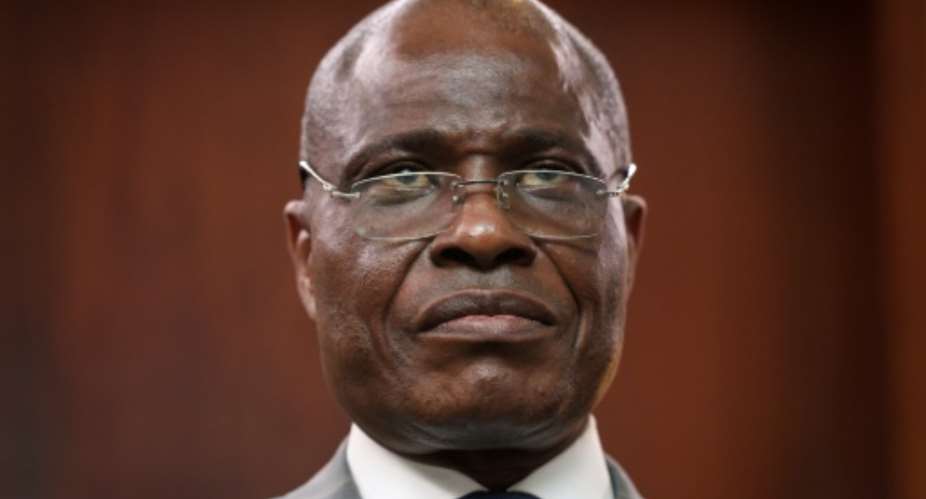A DR Congo legislator chosen by opposition leaders to be their champion in next month's presidential election pleaded for unity on Tuesday after their historic deal was shot down by party activists.
Martin Fayulu, a little-known MP unexpectedly selected as unity candidate in talks in Geneva, insisted the accord was not dead and buried, and urged dissenting leaders to return to it.
"The agreement is still alive," Fayulu said on the television channel TV5Monde after two other party leaders backed away from the accord just a day after signing it.
"I urge my brothers to overcome partisan considerations and to give priority to the nation's higher interests," he said later in a tweet. "It's never too late to do the right thing."
With the December 23 ballot looming fast, six other opposition leaders agreed on Sunday to rally behind Fayulu as their joint champion.
The move sought to overcome internal differences to boost the opposition's chances of defeating President Joseph Kabila's hand-picked candidate, Emmanuel Ramazani Shadary, a loyalist and hardline former interior minister.
The elections, also unfolding at legislative and municipal level, are a watershed for this volatile, poverty-stricken country, which Kabila has ruled with an iron fist since 2001. Foreign observers fear a violent flareup if the vote goes awry.
'Extremely serious'
But less than a day after the Geneva deal was signed, the accord came under fire from activists in two parties and within hours their leaders announced they were scrapping their support.
One is the Union for Democracy and Social Progress (UDPS), DRC's oldest and biggest opposition party, led by Felix Tshisekedi, who was widely seen as the frontrunner. The other is the smaller Union for the Congolese Nation (UNC), led by Vital Kamerhe.
Fayulu, in his TV interview, said the U-turn was "extremely serious."
"What message are we sending to children and the public, especially we in the opposition who are always saying that the Kabila government does not respect the constitution?" he asked.
But a UDPS official in Brussels, where Tshisekedi went after Geneva, told AFP, "For the time being, the dialogue is off."
Only four opposition leaders had their candidacies approved by the election board, and the Geneva agreement requires that the other three withdraw out of "solidarity" with the unity candidate -- a move angrily rejected by the UDPS and UNC activists who protested on Monday.
According to an opinion poll published in late October, Tshisekedi and Kamerhe were leading the pack ahead of the December election followed by Ramazani Shadary.
'Boycott' fear
 UDPS leader Felix Tshisekedi had initially supported the deal to back a unity candidate but later withdrew his support after party activists protested. By Fabrice COFFRINI (AFP)
UDPS leader Felix Tshisekedi had initially supported the deal to back a unity candidate but later withdrew his support after party activists protested. By Fabrice COFFRINI (AFP)
According to the well-informed French-language magazine Jeune Afrique, the Geneva accord also raised the scenario of what would happen if the December 23 elections hit a snag.
In the event the presidential ballot did not take place, opposition leaders would hold a conference to discuss "new options," the magazine said, citing the agreement.
This element of the text incensed UDPS supporters, who suspected a plot to manipulate strategy by two influential opposition figures: former warlord Jean-Pierre Bemba and ex-provincial governor Moise Katumbi.
Both were barred from running in the December ballot by DRC's electoral commission but attended the Geneva talks.
"We thought that our 'barred' friends were not being sincere with us, that they wanted to draw us into a boycott, which is a dangerous path for DRC," UDPS secretary general Jean-Marc Kabund told AFP.
"We had to spill our blood before Kabila agreed to hold these elections. And we're going to sacrifice this effort? We can't accept any of that," he said.
Voting machines dispute
In another rift with fellow opposition parties, the UDPS has also said it will accept the use of electronic voting machines if this means the ballot can go ahead. Critics, including Fayulu, oppose the machines, seeing them as an invitation to fraud.
The squabbles have predictably been fodder for Kabila's side, who on Twitter said the divisions represented "the nth betrayal of our people by the leaders of the Congolese opposition."
The pro-democracy anti-Kabila movement, Lucha, voiced its dismay.
"Our only choice is to forge change by ourselves," it said.
"We've had enough! Our Congo deserves better than this."





 Whoever participated in the plunder of the state must be held accountable – Jane...
Whoever participated in the plunder of the state must be held accountable – Jane...
 A vote for John and Jane is a vote to pull Ghana from the precipice of destructi...
A vote for John and Jane is a vote to pull Ghana from the precipice of destructi...
 I’ll repay your abiding confidence with loyalty, understanding and a devotion to...
I’ll repay your abiding confidence with loyalty, understanding and a devotion to...
 ‘I’ve learnt deeply useful lessons for the future' — Serwaa Amihere breaks silen...
‘I’ve learnt deeply useful lessons for the future' — Serwaa Amihere breaks silen...
 I’m sorry for the embarrassment – Serwaa Amihere apologises for leaked sex video
I’m sorry for the embarrassment – Serwaa Amihere apologises for leaked sex video
 Dumsor: Matthew Opoku Prempeh not in charge of Energy sector – Minority
Dumsor: Matthew Opoku Prempeh not in charge of Energy sector – Minority
 Adu Boahen’s murder: Police arrest house help who was in possession of deceased’...
Adu Boahen’s murder: Police arrest house help who was in possession of deceased’...
 Akufo-Addo nominates Felicia Attipoe as Tema West MCE
Akufo-Addo nominates Felicia Attipoe as Tema West MCE
 Election 2024: I can't have someone I defeated twice as my successor – Akufo-Add...
Election 2024: I can't have someone I defeated twice as my successor – Akufo-Add...
